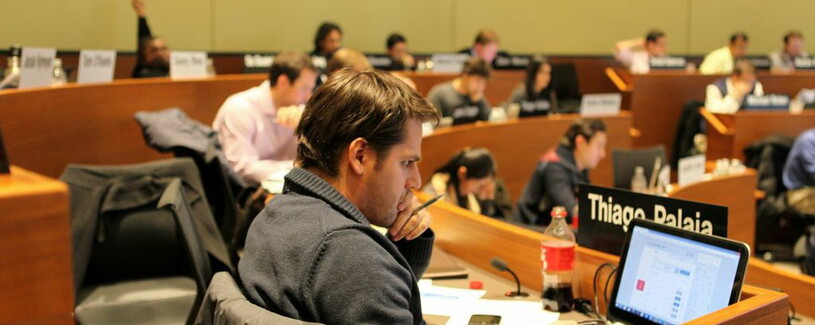Embedding Sustainability in Executive Education at Yale SOM

The Executive MBA program at Yale launched in 2005. Less than a year ago, the program was designed to cater to professionals with full-time careers in Health Care. Last year, faculty at the School of Management and the Yale School of Forestry & Environmental Studies set out to add two additional tracks - sustainability and asset management - in order to further advance Yale’s mission to educate leaders for business and society.
Faculty and staff at the School of Management and the School of Forestry & Environmental Studies crafted the integrated sustainability curriculum based on the notion that a broad shift has arisen between making sustainability not a question of corporate sustainability but one of corporate success.
“The shift includes a perspective that sustainability can be a driver of innovation and that it actually broadens, not constrains the opportunities available to companies,” says Paul Anastas, the Faculty Director of the Sustainability Curriculum.
To continue catalyzing this shift, leading institutions like Yale are realizing that Executive education can help leaders across industries and sectors to combine their expertise with major sustainability trends and approaches in order to drive broad level economic transformation.
Yale already has substantial infrastructure in place to cater to students and professionals interested in sustainability issues. For instance, the Yale Center for Business and the Environment was founded back in 2006 in large part to serve as a resource for students pursuing a joint degree between the full time MBA and FES. The School of Forestry & Environmental Studies has been in existence since the turn of the 20th century – educating forestry, and now broad sustainability professionals, mostly in nonprofit and government sectors. Yale’s full time MBA program also offers a plethora of courses and clubs in clean energy finance and other sustainability issues.
However, until now there has been no formal way for Yale to combine these existing resources for executive professionals particularly interested in business training.
"This is a powerful way for our students to differentiate themselves as leaders. Organizations are innovating boldly and wooing investors by advancing sustainable initiatives. If our graduates are not prioritizing sustainability, they risk being left behind”, says Vani Nadarajah, Director of Admissions for Executive MBA and Global Programs at the Yale School of Management.
Who comprises this inaugural cohort? Vani and the rest of the admissions team recruited 10 professionals who have held leadership positions from industries as broad as China’s garment industry to the forensics practice at PwC.
Four members of the inaugural class of 2016 are highlighted below. These leaders lend very different perspectives in sustainability – and their combined expertise is what will continue to make this program a hotbed for learning and innovation both in and outside of Yale for decades to come.
Christian Balderrama, Strategic Planner Lead for the Eastern Mediterranean Group at Noble Energy, Inc.
Christian began his career at Noble Energy, Inc. with experience in Drilling, Production and Reservoir Engineering after earning a B.Sc. in Petroleum Engineering in 2008. He is now the Strategic Planner Lead for the Eastern Mediterranean group at Noble Energy, Inc.
When Christian was working on a natural gas project in Israel, he learned that Israel was planning to reduce their GHG emissions by 214 million metrics tonnes of Co2, which is equivalent to taking all of the cars off the road in Israel for 15 years. This project inspired him to come to Yale specifically focused on the sustainability program – to learn more innovative ways to provide energy to the world, and better people’s lives along the way.
Richa Pandey, Manager in the Forensics Practice at PwC
Richa leads teams to assist in corporate fraud, dispute analysis and forensic investigations. Her work includes assessing and implementing information risk management strategies that utility, energy and mining companies can utilize.
Richa came to Yale to learn how sustainability, a topic that utility and energy companies are far too familiar with, can integrate not only into businesses that provide us basic necessities such as gas, electricity, and water, but also how we as a society can take more responsibility by educating ourselves and our communities to support sustainability for our future.
Marc Peterman, Worldwide Vice President of Product Development for DePuy Synthes Spine, a Johnson and Johnson company
Marc was formerly head of US Product Development for Synthes Spine prior to the $19.7B acquisition of Synthes by Johnson & Johnson in 2012. He currently manages a team of 140 engineering professionals in Massachusetts, Switzerland and China, supporting a $2B spine business. Marc holds 23 issued US patents and has contributed many products to the field of spinal orthopedics.
Marc is carrying the goal of re-writing his company’s development process together with two other VP’s. He thinks if he can get the right support that it can be incredibly meaningful for the 10-billion-dollar franchise he helps lead, and also add momentum to what’s happening across the J&J enterprise. As the #5 company in the world by market cap, this has a huge potential ripple effect.
Dulith Wijewardene, Worldwide Business Operations Manager at IBM
Duli is responsible for assisting Executive Leadership in managing day-to-day operations of the Rational Client Success group at IBM and his core expertise is in customer satisfaction. Duli has played a number of different roles at IBM, including Sales and Software Quality Assurance.
Duli came to Yale to seek out opportunities to do good and primarily to use his expertise and role within IBM to more effectively help companies shift their mindset not just to focus on the bottom line, but more comprehensive sustainability issues.
“Think what a difference it would make to us if we all regarded life from that point of view – if we went through it looking for opportunities of doing good” - Charles Webster Leadbeater
For more information about the Executive Sustainability curriculum, please visit: http://som.yale.edu/our-programs/emba/curriculum/areas-focus/sustainability